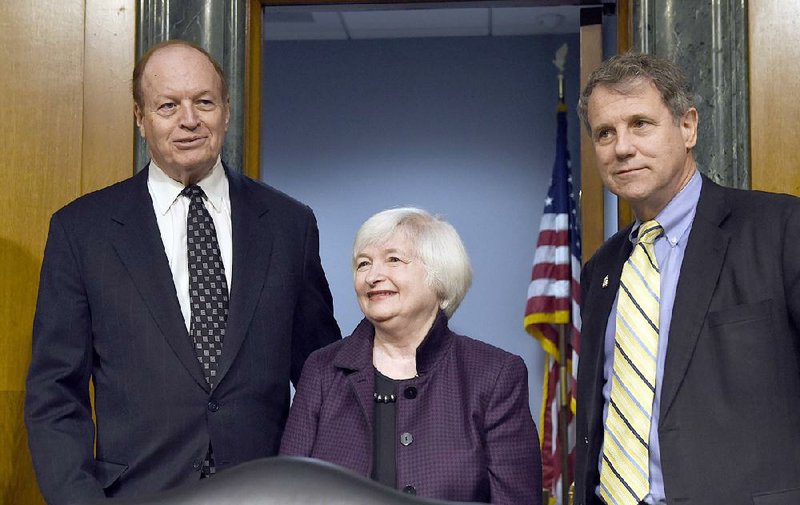WASHINGTON -- Federal Reserve Chairman Janet Yellen said Tuesday that the Fed was pleased with recent economic growth, convinced there was plenty of room for improvement and in no hurry to start raising interest rates.
Patience remains the Fed's watchword, Yellen said in testimony to the Senate Banking Committee.
"There has been important progress," she said. "However, despite this improvement, too many Americans remain unemployed or underemployed, wage growth is still sluggish, and inflation remains well below our longer-run objective."
Yellen's testimony puts her on a collision course with Senate Republicans who worry the Fed is creating bubbles in financial markets and losing control of inflation. Sen. Richard Shelby, R-Ala., who just resumed chairmanship of the banking committee, made both points in his remarks.
"Many question whether the Fed can rein in inflation and avoid destabilizing asset prices when the time comes to unwind its massive $4.5 trillion balance sheet," Shelby said. Patience, he warned, "could lead to a more painful correction down the road."
Both Democrats and Republicans have proposed measures in recent months to reduce the Fed's policymaking autonomy. Shelby said Tuesday that the Fed should be subject to "additional oversight by Congress and further reforms" and that the committee would hold a hearing to discuss proposals next week.
Sen. Sherrod Brown of Ohio, the ranking Democrat on the committee, countered that concerns about inflation were misplaced and that proposals to constrain the Fed were misguided.
"Some pundits and politicians for years have been predicting runaway inflation, but they clearly do not have a very good grasp of what is happening for most Americans," Brown said. "Low wage growth has continued for the majority of Americans, and the declining participation in the workforce is troubling."
Yellen offered an upbeat assessment of the economic recovery, echoing the statement the Fed issued after its most recent meeting in January.
"Considerable progress has been achieved in the recovery of the labor market, though room for further improvement remains," she said.
She added that the collapse of global oil prices appeared to be "a significant overall plus" for the domestic economy, supporting more household spending.
Yellen cautioned that the weakness of other developed economies could slow growth in the United States. On the other hand, she said, the recent efforts by policymakers in those countries -- including the stimulus campaign announced by the European Central Bank -- could provide a lift to the United States, too.
Some Fed officials expressed concern at the January meeting about sluggish inflation and the decline of some measures of inflation expectations. Just as too much inflation can disrupt economic growth, so can too little.
Until recently, the Fed has maintained an official view that the weakness is a temporary affair. Yellen said this was still true, "as best we can tell," but she acknowledged that some of the recent downturn may not reverse quickly.
The strength of inflation has become the decisive factor in Fed policy. The Fed views the job market as strong enough to withstand higher interest rates, but Yellen reiterated that the central bank will not act until it "is reasonably confident that inflation will move back over the medium term toward our 2 percent objective."
Yellen also reviewed the signals the Fed intends to use in the coming months. She said the presence of the word "patient" in the Fed's latest policy statement means it does not intend to raise its benchmark interest rate during the two meetings after the release of that statement. If the word appears in the statement issued after the Fed's mid-March meeting, it would indicate that the central bank does not intend to raise rates until its scheduled meeting at the end of July, at the earliest.
"If economic conditions continue to improve, as the committee anticipates, the committee will at some point begin considering an increase in the target range for the federal funds rate on a meeting-by-meeting basis," Yellen added.
The Fed will change the wording of the statement when that happens, she said, adding that the eventual move to a shorter decision-making horizon should still not be taken to indicate that the Fed would then move quickly to raise rates.
Business on 02/25/2015
